市场营销学英文
- 格式:pptx
- 大小:413.30 KB
- 文档页数:37
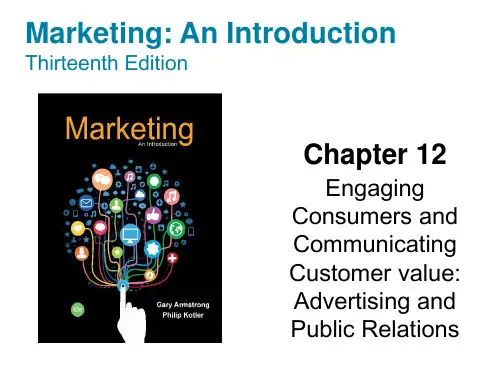
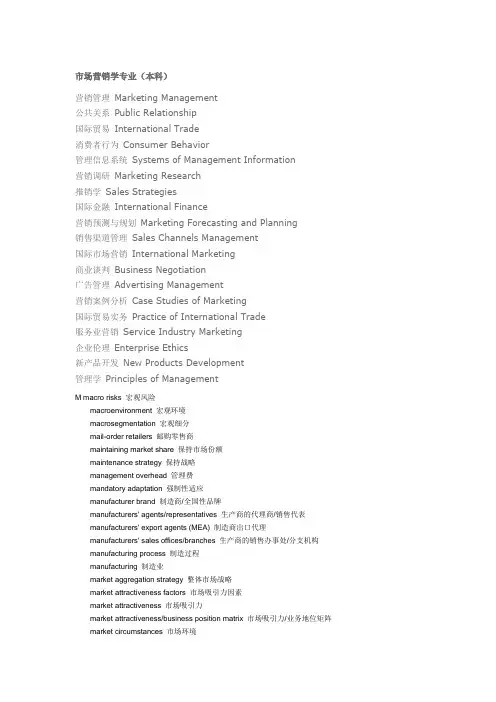
市场营销学专业(本科)营销管理Marketing Management公共关系Public Relationship国际贸易International Trade消费者行为Consumer Behavior管理信息系统Systems of Management Information营销调研Marketing Research推销学Sales Strategies国际金融International Finance营销预测与规划Marketing Forecasting and Planning销售渠道管理Sales Channels Management国际市场营销International Marketing商业谈判Business Negotiation广告管理Advertising Management营销案例分析Case Studies of Marketing国际贸易实务Practice of International Trade服务业营销Service Industry Marketing企业伦理Enterprise Ethics新产品开发New Products Development管理学Principles of ManagementM macro risks 宏观风险macroenvironment 宏观环境macrosegmentation 宏观细分mail-order retailers 邮购零售商maintaining market share 保持市场份额maintenance strategy 保持战略management overhead 管理费mandatory adaptation 强制性适应manufacturer brand 制造商/全国性品牌manufacturers' agents/representatives 生产商的代理商/销售代表manufacturers' export agents (MEA) 制造商出口代理manufacturers' sales offices/branches 生产商的销售办事处/分支机构manufacturing process 制造过程manufacturing 制造业market aggregation strategy 整体市场战略market attractiveness factors 市场吸引力因素market attractiveness 市场吸引力market attractiveness/business position matrix 市场吸引力/业务地位矩阵market circumstances 市场环境market demorgraphics 市场人口分布/统计特征market dimension 市场量度market entry strategies 市场进入战略market exclusion 市场排斥market expansion strategy 市场扩张战略market factors 市场因素market followers 市场跟随者market growth rate 市场增长率market hirarchy 市场等级market inclusion 市场纳入market leaders 市场领导者market measurement 市场测量market opportunity analysis 市场机会分析market oriented 以市场为导向的market position factors 市场地位因素market positioning analysis 市场定位分析损益预估Profit and loss forecast综合意见反馈Comprehensive feedback售后服务after-sale service客户群培养Customer training制订销售目标Set sales target明确市场切入点Clear the market entry point 确立目标市场establish the target market前期市场调查The preliminary market investigation销售管理Sales management。
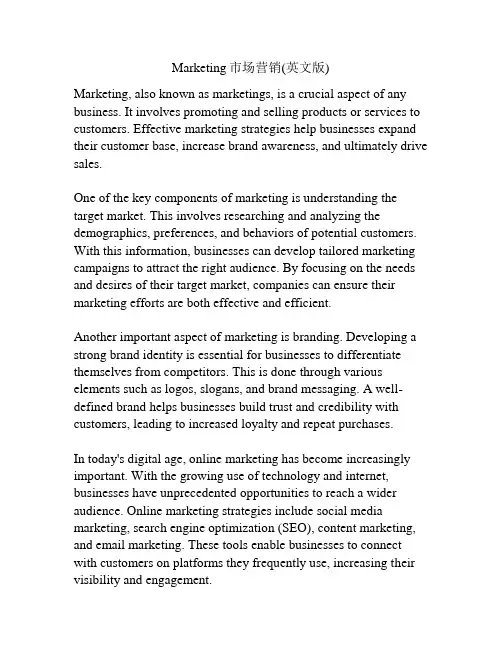
Marketing市场营销(英文版)Marketing, also known as marketings, is a crucial aspect of any business. It involves promoting and selling products or services to customers. Effective marketing strategies help businesses expand their customer base, increase brand awareness, and ultimately drive sales.One of the key components of marketing is understanding the target market. This involves researching and analyzing the demographics, preferences, and behaviors of potential customers. With this information, businesses can develop tailored marketing campaigns to attract the right audience. By focusing on the needs and desires of their target market, companies can ensure their marketing efforts are both effective and efficient.Another important aspect of marketing is branding. Developing a strong brand identity is essential for businesses to differentiate themselves from competitors. This is done through various elements such as logos, slogans, and brand messaging. A well-defined brand helps businesses build trust and credibility with customers, leading to increased loyalty and repeat purchases.In today's digital age, online marketing has become increasingly important. With the growing use of technology and internet, businesses have unprecedented opportunities to reach a wider audience. Online marketing strategies include social media marketing, search engine optimization (SEO), content marketing, and email marketing. These tools enable businesses to connect with customers on platforms they frequently use, increasing their visibility and engagement.Another effective marketing technique is influencer marketing.This involves collaborating with influential individuals, such as celebrities or social media personalities, to promote products or services. By leveraging the popularity and credibility of these influencers, businesses can reach a larger audience and gain credibility and trust from their followers.Marketing also involves analyzing and measuring the effectiveness of marketing campaigns. This is done through metrics such as return on investment (ROI), customer acquisition cost (CAC), and customer lifetime value (CLTV). By tracking these metrics, businesses can evaluate the success of their marketing efforts and make any necessary adjustments to optimize their strategies.In conclusion, marketing plays a vital role in business success. It helps businesses understand their target market, build strong brands, and reach a wider audience through various channels. By implementing effective marketing strategies, businesses can increase their customer base, boost brand awareness, and ultimately drive sales.在一个竞争激烈的商业环境中,有效的营销策略是企业取得成功的关键。
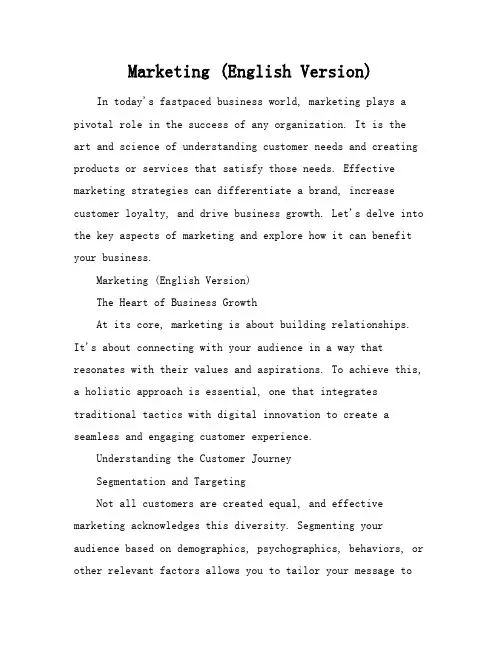
Marketing (English Version) In today's fastpaced business world, marketing plays a pivotal role in the success of any organization. It is theart and science of understanding customer needs and creating products or services that satisfy those needs. Effective marketing strategies can differentiate a brand, increase customer loyalty, and drive business growth. Let's delve into the key aspects of marketing and explore how it can benefit your business.Marketing (English Version)The Heart of Business GrowthAt its core, marketing is about building relationships.It's about connecting with your audience in a way that resonates with their values and aspirations. To achieve this, a holistic approach is essential, one that integrates traditional tactics with digital innovation to create a seamless and engaging customer experience.Understanding the Customer JourneySegmentation and TargetingNot all customers are created equal, and effective marketing acknowledges this diversity. Segmenting your audience based on demographics, psychographics, behaviors, or other relevant factors allows you to tailor your message todifferent groups. This targeted approach ensures that your marketing efforts are more relevant and, consequently, more effective.The Power of StorytellingStories are a universal language that can evoke emotions and create lasting memories. In marketing, storytelling is a powerful tool that can humanize your brand and make it more relatable. By crafting narratives that align with yourbrand's values and mission, you can forge a deeper connection with your audience and inspire them to take action.Leveraging Digital ChannelsMeasuring SuccessMarketing is an investment, and like any investment, it needs to be measured for return. Key performance indicators (KPIs) such as conversion rates, customer acquisition costs, and customer lifetime value provide a clear picture of your marketing efforts' effectiveness. By analyzing these metrics, you can refine your strategies, optimize your budget, and ensure that your marketing activities contribute to your business's bottom line.Continuous ImprovementMarketing (English Version)The Art of Persuasion and EngagementThe essence of marketing lies in its ability to persuade and engage. It's not just about selling products; it's about selling an experience, a lifestyle, and a vision. Here's how businesses can harness the full potential of marketing to achieve their goals.Crafting a Compelling Brand IdentityInfluencing Consumer BehaviorUnderstanding the psychology behind consumer behavior is crucial for marketers. By identifying the triggers that lead to purchasing decisions, you can design campaigns that nudge potential customers towards conversion. This involves not only the rational aspects of product features and benefits but also the emotional appeal that can often be the deciding factor in a consumer's choice.The Role of Content MarketingContent marketing is the strategic creation and distribution of valuable, relevant, and consistent content to attract and retain a clearly defined audience. It's about educating your customers, entertaining them, and providing solutions to their problems. From blog posts to videos, infographics to podcasts, highquality content can establish your brand as an authority in your industry and build trust with your audience.Collaborating with InfluencersCustomer Engagement and Retention Ethical Marketing Practices。
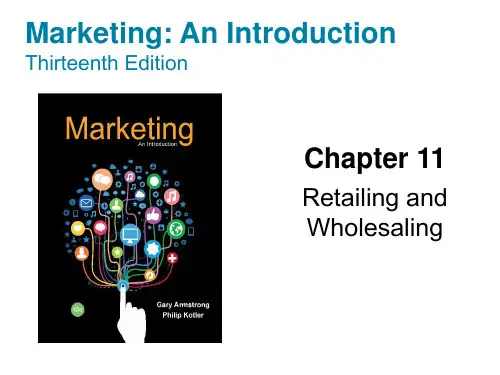
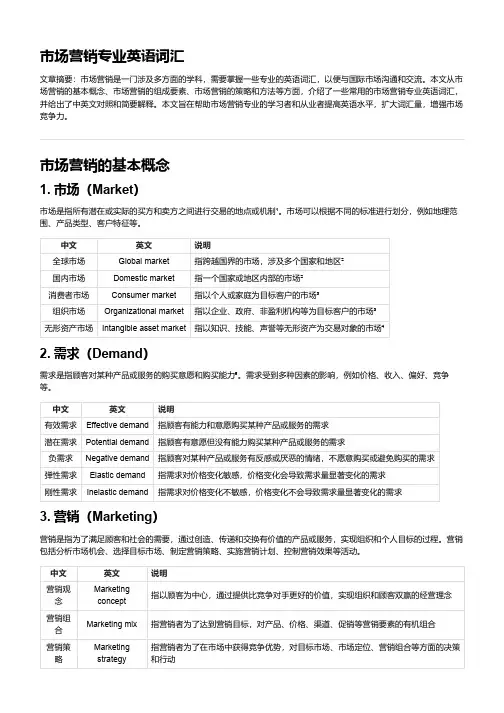
市场营销专业英语词汇文章摘要:市场营销是一门涉及多方面的学科,需要掌握一些专业的英语词汇,以便与国际市场沟通和交流。
本文从市场营销的基本概念、市场营销的组成要素、市场营销的策略和方法等方面,介绍了一些常用的市场营销专业英语词汇,并给出了中英文对照和简要解释。
本文旨在帮助市场营销专业的学习者和从业者提高英语水平,扩大词汇量,增强市场竞争力。
市场营销的基本概念1. 市场(Market)市场是指所有潜在或实际的买方和卖方之间进行交易的地点或机制¹。
市场可以根据不同的标准进行划分,例如地理范围、产品类型、客户特征等。
中文英文说明全球市场Global market指跨越国界的市场,涉及多个国家和地区²国内市场Domestic market指一个国家或地区内部的市场²消费者市场Consumer market指以个人或家庭为目标客户的市场³组织市场Organizational market指以企业、政府、非盈利机构等为目标客户的市场³无形资产市场Intangible asset market指以知识、技能、声誉等无形资产为交易对象的市场⁴2. 需求(Demand)需求是指顾客对某种产品或服务的购买意愿和购买能力⁵。
需求受到多种因素的影响,例如价格、收入、偏好、竞争等。
中文英文说明有效需求Effective demand指顾客有能力和意愿购买某种产品或服务的需求潜在需求Potential demand指顾客有意愿但没有能力购买某种产品或服务的需求负需求Negative demand指顾客对某种产品或服务有反感或厌恶的情绪,不愿意购买或避免购买的需求弹性需求Elastic demand指需求对价格变化敏感,价格变化会导致需求量显著变化的需求刚性需求Inelastic demand指需求对价格变化不敏感,价格变化不会导致需求量显著变化的需求3. 营销(Marketing)营销是指为了满足顾客和社会的需要,通过创造、传递和交换有价值的产品或服务,实现组织和个人目标的过程。
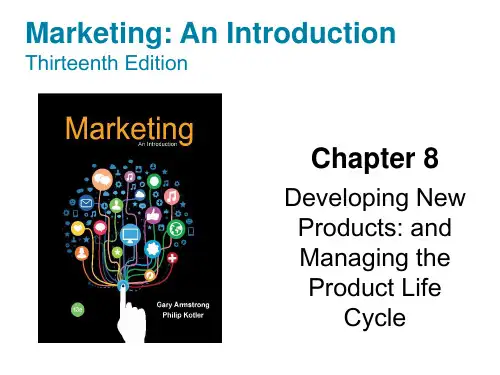
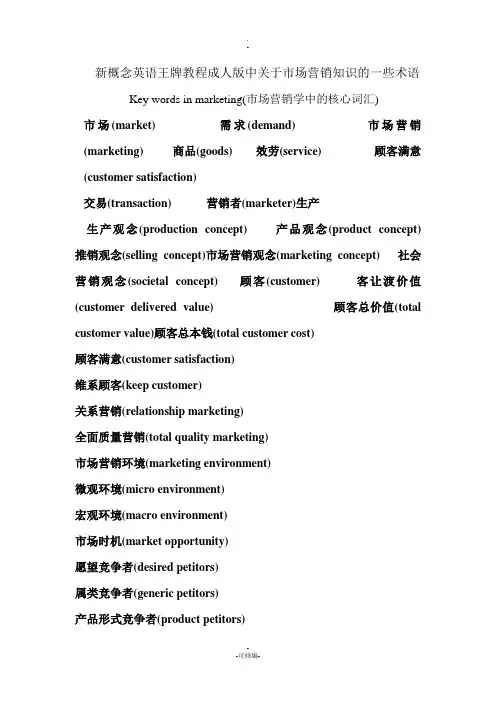
新概念英语王牌教程成人版中关于市场营销知识的一些术语Key words in marketing(市场营销学中的核心词汇)市场(market) 需求(demand) 市场营销(marketing) 商品(goods) 效劳(service) 顾客满意(customer satisfaction)交易(transaction) 营销者(marketer)生产生产观念(production concept) 产品观念(product concept) 推销观念(selling concept)市场营销观念(marketing concept) 社会营销观念(societal concept) 顾客(customer) 客让渡价值(customer delivered value) 顾客总价值(total customer value)顾客总本钱(total customer cost)顾客满意(customer satisfaction)维系顾客(keep customer)关系营销(relationship marketing)全面质量营销(total quality marketing)市场营销环境(marketing environment)微观环境(micro environment)宏观环境(macro environment)市场时机(market opportunity)愿望竞争者(desired petitors)属类竞争者(generic petitors)产品形式竞争者(product petitors)品牌竞争者(brand petitors)公众(publics)目标市场(target market)市场营销组合(marketing mix)情绪(moods)消费者行为(customer behavior) 文化(culture)人口统计因素(demographics)社会阶层(social class)亚文化(subculture)参照群体(reference group)角色模型(role stereotype)知觉(perception)认知学习(cognitive learning)动机(motive)个性(personality)情绪(emotion)态度(attitude)自我概念(self-concept)生活方式(life style)组织市场(organizational market) 企业市场(business market)非营利组织(non-profit organization)非营利组织市场(non-profit organization market) 政府市场(government market)直接再购(straight rebuy)修正再购(modify rebuy)新任务采购(new task)购置中心(buying center)建议者(initiators)使用者(users)影响者(influencers)决定者(deciders)购置者(buyers)控制者(gatekeepers)营销信息(marketing information)营销信息系统(marketing information system,MIS) ~市场调研(marketing research)描述性调研(descriptive research)解释性调研(interpretive research)预测性调研(predictive research)市场需求量(market demand)企业需求量(market demand potential)定性预测(qualitative forecasting)定量预测(quantitative forecasting)企业战略(enterprise strategy)企业使命说明书(mission statement)战略经营单位(strategic business units,SBU)波士顿矩阵(Boston matrix)通用电器公司方法(the General Electric Model,GE) 市场吸引力(marketing attractiveness)业务实力(business attractiveness)密集型增长战略(intensive growth strategies)市场渗透(market penetration strategy)市场开发(market development strategy)产品开发(product development strategy)一体化增长战略(integrative growth strategies)前向一体化(forward integration)后向一体化(backward integration)水平一体化(horizontal integration)多角化增长战略(diversification growth strategies) 同心多角化(concentric diversification)水平多角化(horizontal diversification)复合多角化(conglomeration diversification)市场营销战略(marketing strategy)市场营销组合(marketing mix)市场营销组织(marketing organization)职能型组织(functional organization)地区型组织(regional organization)产品管理型组织(managerial organization of product)市场管理型组织(managerial organization of market)公司与事业部型组织(organization of corporation and business unit) 市场营销管理(marketing management)市场营销方案(marketing planning)市场营销方案(marketing program)市场营销控制(marketing controlling)市场竞争(market petition)完全竞争(market leader)非完全竞争(imprecate petition)垄断竞争(monopolistic petition)市场领导者(market leader)市场挑战者(market challenger)市场追随者(market follower)市场补缺者(market niche)市场细分(market segmentation)目标市场(target market)市场定位(market positioning)无差异性市场战略(undifferentiated marketing tactics)差异性市场战略(differentiated marketing tactics)集中性市场策略(concentrated marketing tactics)产品(product)效劳(service)核心产品(core product)形式产品(actual product)期望产品(expected product)延伸产品(augmented product)~潜在产品(potential product)耐用品(durablegoods)非耐用品(nondurable goods)产品线(product line)产品工程(product item)产品组合(product mix or product assortment)产品组合的长度(product mix length)产品组合的深度(product mix depth)产品组合的关联度(product mix consistency)产品生命周期(product life cycle)开发期(development stage)引进期(introduction stage)成长期(growth stage)成熟期(maturity stage)衰退期(decline stage)新产品开发(new product development)产品概念(product concept)商业化(mercialization)包装(package)包装策略(packaging strategy)品牌(brand)品牌命名(brand naming)品牌决策(branding decision)统一品牌(blanket family brand)品牌使用者决策(brand-sponsor decision)个别品牌(individual brand)多品牌(multi-brands)统一的个别品牌(pany/individual brand)合作品牌(co-branding)品牌资产(brand equity)品牌设计(brand designing)品牌延伸(brand extension)内涵不变式延伸(gradual changing meaning extension))品牌管理(brand management)本钱导向定价(cost-driven pricing)需求导向定价(demand-driven pricing)竞争导向定价(petition-driven pricing)折扣定价(discount pricing)地区定价(region pricing)差异定价(discrimination pricing)撇脂定价(skim pricing)渗透定价(penetration pricing)满意定价(neutral pricing)尾数定价(mantissa pricing)整数定价(integer pricing)招来定价(fetch-in pricing)声望定价(prestige pricing)目标收益定价法(target-return pricing)认知价值定价法(perceived-value pricing)价值定价法(value pricing)通行价格定价法(going-rate pricing)分销渠道(distribution channel)中间商(intermediate)分销渠道设计(distribution channel disign)实体分配(physical distribution)渠道冲突(channel conflict)促销(promotion)促销策略(promotion policies)情感诉求(emotional appeals)理性诉求(rational appeals)道德诉求(moral appeals)群众传播媒体(mass media)气氛(atmosphere)事件(events)量力支出法(affordable method)销售额百分比法(percentage-of-sales method)竞争对等法(petitive-parity method)目标任务法(objective-task method)广告(advertising)公共关系(public relations)营业推广(sales promotion)促销组合(promotion mix)推动策略(push strategy)拉引策略(pull strategy)广告目标(mission)告知性广告(information advertising)劝说性广告(persuasive advertising)提示性广告(reminder advertising)整合营销传播(integrated marketing munication)接触管理(contact management)人员推销(personal selling)效劳(service)效劳核心产品(core product)效劳附加产品(supplementary product)整合效劳营销(integrated service marketing)效劳的无形性(intangibility of service)效劳的体验属性(experience attributes)效劳的信任度属性(credence attributes)效劳的有形展示(physical evidence)关系营销(relationship marketing)体育营销(sports marketing)绿色营销(green marketing)城市营销(city marketing)网络营销(network marketing)会展营销(exhibition marketing)文化营销(cultural marketing需要:need欲望want需求:demand产品:product关系营销:relationship marketing 营销网:marketing network生产观念:the production concept 产品观念:the product concept相关群体:reference group购置者角色:buying role购置行为:buying behavior认知需求:problem recognization 搜集信息:information search组织者市场:organization market 派生需求:derived demand缺乏弹性:inelastic demand品牌策略:brand strategy制造商品牌:manufactures brand 定价策略:pricing strategie现金折扣:cash discount数量折扣:quantity discount功能折扣:functional discount季节折扣:seasonal discount新产品定价:new product pricing产品组合定价:product-mix pricing 分销渠道:distribution channel密集分销渠道:intensive distribution 选择性分销:selective distribution独家分销:exclusive distribution中间商品牌:intermediaries brand 批发商:whoksaler零售商:retailer百货公司:department store超市:supermarket便利店:convenience store折扣店:discount store促销组合:promotion mix交流信息:municating information 人员销售:personalo selling广告策略advertising strateqie公共关系public relation营销调研:marketing research产品策略:product strategie产品组合:product mix营销观念:the marketing concept消费者市场consumer market顾客满意:customer satisfaction顾客总价值:total customer value顾客总本钱:total customer value营销环境:marketing environment营销信息系统:marketing information syste 市场细分策略:market segmentationstartegie 目标市场策略:market tageting strategie市场定位策略market positioning strategie产品市场寿命周期;the product life cycle销售观念:the selling/sales concept社会营销观念:the societal marketing concept 宏观营销环境:macro-marketing environment 消费者行为模式:model of consumer behavior 价值,本钱和满意:value,cost,andsatisfaction 交换和交易exchange and transaction营销者和预期顾客:marketers。
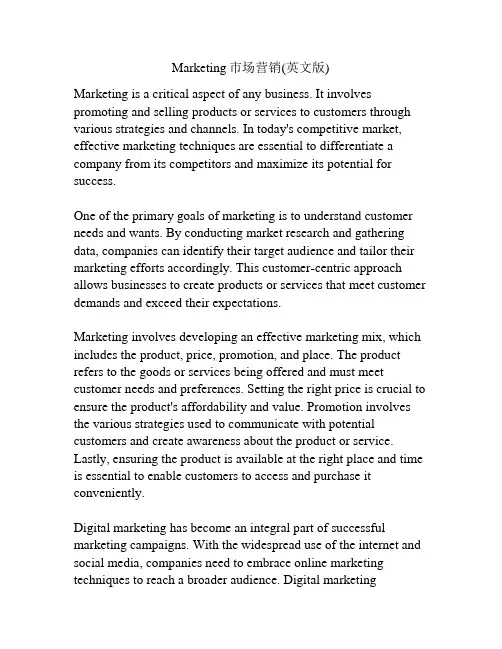
Marketing市场营销(英文版)Marketing is a critical aspect of any business. It involves promoting and selling products or services to customers through various strategies and channels. In today's competitive market, effective marketing techniques are essential to differentiate a company from its competitors and maximize its potential for success.One of the primary goals of marketing is to understand customer needs and wants. By conducting market research and gathering data, companies can identify their target audience and tailor their marketing efforts accordingly. This customer-centric approach allows businesses to create products or services that meet customer demands and exceed their expectations.Marketing involves developing an effective marketing mix, which includes the product, price, promotion, and place. The product refers to the goods or services being offered and must meet customer needs and preferences. Setting the right price is crucial to ensure the product's affordability and value. Promotion involves the various strategies used to communicate with potential customers and create awareness about the product or service. Lastly, ensuring the product is available at the right place and time is essential to enable customers to access and purchase it conveniently.Digital marketing has become an integral part of successful marketing campaigns. With the widespread use of the internet and social media, companies need to embrace online marketing techniques to reach a broader audience. Digital marketingstrategies include search engine optimization (SEO), content marketing, social media advertising, email marketing, and influencer marketing. These methods help businesses connect with potential customers, increase brand visibility, and generate leads.Another critical aspect of marketing is building and maintaining strong customer relationships. Customer relationship management (CRM) is a strategy that helps companies track and analyze customer interactions to improve their overall experience. By understanding customer preferences, addressing their concerns, and providing excellent customer service, companies can build loyalty and retain customers in the long run.In today's fast-paced and highly competitive market, companies need to stay ahead of their competitors by continuously enhancing their marketing strategies. This requires staying updated with the latest marketing trends and technologies, monitoring competitor activities, and adapting accordingly. Additionally, companies must be flexible and willing to adjust their marketing efforts as market conditions and customer preferences change.In conclusion, marketing plays a vital role in the success of any business. By understanding customer needs, developing an effective marketing mix, embracing digital marketing techniques, and building strong customer relationships, companies can maximize their potential and stay ahead of the competition. It is crucial for businesses to continuously improve their marketing strategies to remain relevant and meet the evolving demands of their target audience.继续发展相关主题-内容营销:内容营销是当下营销领域的一个重要策略。
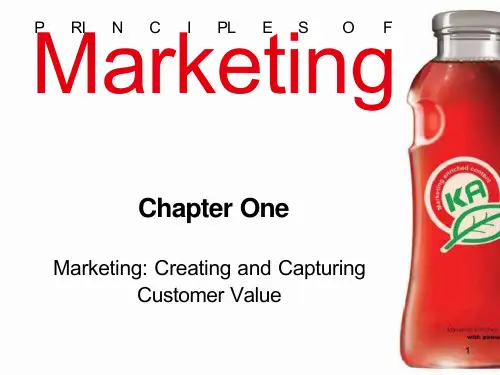
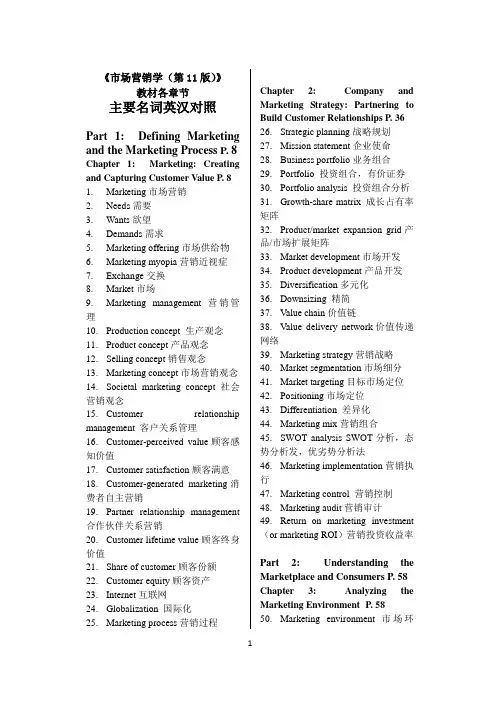
《市场营销学(第11版)》教材各章节主要名词英汉对照Part 1: Defining Marketingand the Marketing Process P. 8 Chapter 1: Marketing: Creating and Capturing Customer Value P. 81.Marketing市场营销2.Needs需要3.Wants欲望4.Demands需求5.Marketing offering市场供给物6.Marketing myopia营销近视症7.Exchange交换8.Market市场9.Marketing management 营销管理10.Production concept 生产观念11.Product concept产品观念12.Selling concept销售观念13.Marketing concept市场营销观念14.Societal marketing concept社会营销观念15.Customer relationship management 客户关系管理16.Customer-perceived value顾客感知价值17.Customer satisfaction顾客满意18.Customer-generated marketing消费者自主营销19.Partner relationship management 合作伙伴关系营销20.Customer lifetime value顾客终身价值21.Share of customer顾客份额22.Customer equity顾客资产23.Internet互联网24.Globalization 国际化25.Marketing process营销过程Chapter 2: Company and Marketing Strategy: Partnering to Build Customer Relationships P. 3626.Strategic planning战略规划27.Mission statement企业使命28.Business portfolio业务组合29.Portfolio 投资组合,有价证券30.Portfolio analysis 投资组合分析31.Growth-share matrix 成长占有率矩阵32.Product/market expansion grid产品/市场扩展矩阵33.Market development市场开发34.Product development产品开发35.Diversification多元化36.Downsizing 精简37.Value chain价值链38.Value delivery network价值传递网络39.Marketing strategy营销战略40.Market segmentation市场细分41.Market targeting目标市场定位42.Positioning市场定位43.Differentiation 差异化44.Marketing mix营销组合45.SWOT analysis SWOT分析,态势分析发,优劣势分析法46.Marketing implementation营销执行47.Marketing control 营销控制48.Marketing audit营销审计49.Return on marketing investment (or marketing ROI)营销投资收益率Part 2: Understanding the Marketplace and Consumers P. 58 Chapter 3: Analyzing the Marketing Environment P. 5850.Marketing environment 市场环境51.Microenvironment微观环境52.Macroenviroment宏观环境53.Marketing intermediaries营销中间商54.Public公众55.Demography 人口统计56.Baby boomers婴儿潮世代57.Generation X X世代lennials(or Generation Y)千禧世代(Y世代)59.Economic environment经济环境60.Engel’s laws恩格尔法则61.Natural environment自然环境62.Technological environment技术环境63.Political environment政治环境64.Cultural environment文化环境Chapter 4: Managing Marketing Information to Gain Customer Insights P. 8265.Customer insights顾客洞察力66.Marketing information system (MIS)市场信息系统67.Internal database内部数据库68.Marketing intelligence营销情报69.Exploratory research探索性调研70.Descriptive research描述性调研71.Causal research因果性调研72.Secondary data二手数据mercial online database商业在线数据库74.Observational research观察式调研75.Ethnographic research民族志调研76.Survey research询问式调研77.Experimental research实验室调研78.Focus group interviewing 焦点小组访谈79.Online marketing research 在线营销调研80.Online focus group在线焦点小组81.Sample样本82.Customer relationship management (CRM)客户关系管理83.Questionnaire 调查问卷Chapter 5: Understanding Consumer and Business Buyer Behavior P. 10884.Culture文化85.Subculture亚文化86.Social class 社会阶层87.Group 团队88.Opinion leader 意见团队89.Online social networks 在线文化网络90.Lifestyle 生活方式91.Personality 个性92.Motive(Drive)动机(驱动力)93.Perception感知94.Learning学习95.Belief信念96.Attitude态度97.Cognitive dissonance 认知失调98.New product 新产品99.Adoption process 采用过程100.Business buyer behavior 产业购买者行为101.Derived demand 派生需求102.Straight rebuy 直接重购103.Modified rebuy 修订重购买104.New task 新任务105.Systems selling(or solutions selling)系统销售(解决方案营销)106.Buying center 采购中心107.Value analysis 价值分析Part 3: Designing a Customer-DrivenMarketing Strategy and Mix P. 138 Chapter 6: Customer-Driven Marketing Strategy: Creating Value for Target Customers P. 138108.Market segmentation 市场细分109.Market targeting(targeting)目标市场选择110.Differentiation 差异化111.Positioning 市场定位112.Geographic segmentation 地理细分113.Demographic segmentation 人口细分114.Age and life-cycle segmentation 年龄和生命周期细分115.Gender segmentation 性别细分116.Income segmentation 收入细分117.Psychographic segmentation 心里细分118.Behavior segmentation 行为细分119.Occasion segmentation 时机细分120.Benefit segmentation 利益细分121.Customer loyalty 顾客忠诚度122.Intermarket segmentation 跨国市场细分123.Target market 目标市场124.Undifferentiated (mass)marketing 无差异营销(大众营销)125.Differentiated (segmented)marketing 差异化营销(细分营销)126.Concentrated ()marketing 集中营销(利基营销)127.Micromarketing 微观营销128.Local marketing 地区营销129.Individual marketing 个性化营销130.Production position 产品定位petitive advantage 竞争优势132.Value proposition 价值主张133.Positioning statement 定位陈述Chapter 7: Products, Services, and Brands: Building Customer Value P. 164134.Product 产品135.Service 服务136.Customer product 消费品137.Convenience product 便利品138.Shopping product 选购品139.Specialty product 特殊品140.Unsought product 非渴求品141.Industrial product 产业用品142.Social marketing 社会营销143.Product quality 产品质量144.Brand 品牌145.Packaging 包装146.Product line 产品线147.Product mix (or product portfolio)产品组合148.Brand equity 品牌资产149.Store brand (or private brand)中间商品牌(自有品牌)150.Co-branding 合作品牌151.Line extension 产品延伸线152.Brand extension 品牌延伸153.Service intangibility服务的无形性154.Service inseparability服务的不可分离性155.Service variability服务的易变性156.Service perishability服务的易逝性157.Service-profit chain服务利润链158.Internal marketing 内部营销159.Interactive marketing 互动营销Chapter 8: Developing New-Product and Managing the Life-Cycle P. 192 160.New-product development 新产品开发战略161.Idea generation 产生创意162.Idea screening 筛选创意163.Product concept 产品观念164.Concept testing 概念测试165.Marketing strategy development 营销战略开发166.Business analysis 商业分析167.Product development 产品开发168.Test marketing 试销mercialization 商业化170.Customer-centered new-product development 以顾客为中心的新产品开发171.Team-based new-product development 基于团队的新产品开发172.Product life cycle 产品生命周期173.Style 风格174.Fashion 时尚175.Fad 热潮176.Introduction stage 导入期177.Growth stage 成长期178.Maturity stage 成熟期179.Decline stage 衰退期Chapter 9: Pricing:Understanding and Capturing Customer Value P. 212 180.Price价格181.Value-based pricing 价值导向定价182.Good-value pricing 最优价值定价183.Value-added pricing 价值增值定价184.Cost-based pricing 成本导向定价185.Fixed costs 固定成本186.Valuable costs 变动成本187.Total costs 总成本188.Cost-plus pricing 成本加成定价189.Break-even pricing (target profit pricing)盈亏平衡定价(目标利润定价)190.Target costing 目标成本法191.Demand curve 需求曲线192.Price elasticity 价格弹性193.Market-skimming pricing 市场撇脂定价194.High-definition television (HDTV)高清电视195.Market-penetration pricing 市场渗透定价196.Optional-product pricing 附属产品定价197.By-product pricing 副产品定价198.Product bundle pricing 产品捆绑定价199.Discount 折扣200.Allowance 折让201.Segmentation pricing 细分定价202.Psychological pricing 心理定价203.Reference pricing 参考定价204.Promotional pricing 促销定价205.Geographical pricing 地理定价206.Dynamic pricing 动态定价Chapter 10: Marketing Channels: Delivering Customer Value P. 242 207.Value delivery network 价值传递网络208.Marketing channel (distribution channel)营销渠道(分销渠道)209.Channel level 渠道层级210.Direct marketing channel 直接营销渠道211.Channel conflict 渠道冲突212.Conventional distribution channel 传统分销渠道213.Vertical marketing system (VMS)垂直营销系统214.Corporate VMS公司VMS(垂直营销系统)215.Contractual VMS 合同式VMS (垂直营销系统)216.Franchise organization 特许经营组织217.Administered VMS 管理式VMS (垂直营销系统)218.Horizontal marketing system 水平营销系统219.Multichannel distribution system 多渠道分销系统220.Disintermediation 去中介化221.Marketing channel design 营销渠道设计222.Intensive distribution 密集分销223.Exclusive distribution 独家分销224.Selective distribution 选择性分销225.Marketing channel management 营销渠道管理226.Marketing logistics (physical distribution)营销物流(物流)227.Supply chain management 供应链管理228.Distribution center 分销中心229.Intermodal transportation 多式联运230.Integrated logistics management 整合物流管理231.Third-party logistics (3PL)provider 第三方物流供应商Chapter 11: Retailing and Wholesaling P. 262232.Retailing 零售233.Specialty store 专卖店234.Department store 百货商店235.Supermarket 超级市场236.Convenience store 便利店237.Superstore 超级商店238.Category killer 品类杀手239.Service retailer 服务零售店240.Discount store 折扣商店241.Off-price retailer 廉价零售店242.Independent off-price retailer 独立廉价零售商243.Factory outlet 工厂直营店244.Warehouse club 仓储俱乐部245.Chain store 连锁店246.Franchise 特许经营247.Shopping center 购物中心248.Wheel-of-retailing concept 零售轮转理论249.Wholesaling 批发250.Wholesaler 批发商251.Merchant wholesaler252.Broker253.Agent254.Manufacturer’s sales branches and offices 制造商的销售分发机构和办事处Chapter 12: Communicating Customer Value: Advertising and Public Relations P. 294255.Promotion mix (Marketing Communication Mix)营销组合(营销沟通组合)256.Advertising 广告257.Sales promotion 销售促进258.Personal selling 人员推销259.Public relations 公告关系260.Direct marketing 直复营销261.Integrated marketing communication (IMC)整合营销沟通262.Push strategy 推式战略263.Pull strategy 拉式战略264.Advertising objective 广告目标265.Advertising budget 广告预算266.Affordable method 量力而行法267.Percentage-of-sale method 销售百分比法petitive-parity method 竞争对等法269.Objective-and-task method 目标任务法270.Advertising strategy 广告战略271.Madison & Vine 麦迪逊大街和好莱坞藤街272.Creative concept 创意概念273.Execution style 创作文体274.Advertising media 广告媒体275.Return on advertising investment 广告投资收益率276.Advertising agency 广告代理商277.Public relation 公共关系Chapter 13: Personal Selling and Sales Promotion P. 324278.Personal selling 人员推销279.Salesperson 销售人员280.Sale force management 销售队伍管理281.Territorial sales force structure 地域型销售组织机构282.Product sales force structure 产品型销售组织机构283.Customer sales force structure 顾客型销售组织机构284.Outside sales force (or field sales force)外部销售队伍(现场销售队伍)285.Inside sales force 内部销售队伍286.Team selling 团队销售287.Sales quota 销售定额288.Selling process 销售过程289.Prospection 寻找线索290.Preapproach 事先调查291.Approach 接触访问292.Presentation 展示293.Handling objection 排除异议294.Closing 完成交易295.Follow-up 后续工作296.Sales promotion 销售促进297.Customer promotions 消费者销售促进298.Event marketing 事件营销299.Trade promotion 贸易销售促进300.Business promotions 商业销售促进Chapter 14: Direct and Online Marketing: Building Direct Customer Relationships P. 348301.Direct marketing 直复营销302.Customer database 顾客数据库303.Direct-mail marketing 直接邮寄营销304.Catalog marketing 目录营销305.Telephone marketing 电话营销306.Direct-response television marketing 电视直销307.Online marketing 在线营销308.Internet 互联网309.Click-only companies 点击企业(即在线交易公司)310.Click-and-mortar companies 虚实结合营销311.Business-to-customer (B2C)online marketing 企业对消费者的在线营销312.Business-to-business (B2B)online marketing企业对企业的在线营销313.Customer-to-customer (C2C)online marketing消费者对消费者的在线营销314.Customer-to-business (C2B)online marketing消费者对企业的在线营销315.Corporate (or brand)Web site 公司(品牌)网站316.Marketing Web site 营销网站317.Online advertising 在线广告318.Viral marketing 病毒营销319.Online social networks 在线社交啊网络320.Spam 垃圾邮件Part 4: Extending Marketing P. 372Chapter 15: The Global Marketplace P. 372321.Global marketplace 全球市场322.Global firm 跨国公司323.Economic community 经济共同体324.Americanization 美国化325.Exporting 出口326.Joint venturing 组建合资公司327.Licensing 许可经营328.Contract manufacturing 合同制造329.Management contracting 合同管理330.Joint ownership 合同所有331.Direct investment 直接投资332.Standardized global marketing 全球标准化营销333.Straight product extension 直接产品延伸334.Product adaptation 产品适应335.Product invention 产品创新munication adaptation 沟通适应337.Whole-channel view 整渠道视野Chapter 16: Sustainable Marketing: Social Responsibility and Ethics P. 394 338.Consumerism 消费者保护主义339.Environmentalism 环境保护主义340.Environmental sustainability 环境可持续发展341.Enlightened marketing 远见营销342.Consumer-oriented marketing 消费者导向营销343.Customer-value marketing 顾客价值营销344.Innovative marketing 创新营销345.Sense-o-mission marketing 使命感营销346.Societal marketing 社会营销347.Deficient product是不完善的产品348.Pleasing products 令人愉快的产品349.Salutary products 有益的产品。
Marketing(From: Sun Kun of Accounting English, 2008.)Marketing is a group of interrelated activities designed to identify consumer needs and to develop,distribute,promote,and price goods and services to satisfy these needs at a profit.Whether an organization is large or small,whether it produces a product or provides a service,its long-range future is linked to successful markting practices.The old saying "Build a better mousetrap and the world will beat a path to your door"is not true. "They" must need the product,know about it,be able to get it when and where they want it,and be able to afford it.Marketing provides the means to make the organization successful in the long run.1.The Marketing ConceptMarketing was unheard of in the early 1900s. This period can best be described as one where far more people needed consumer goods than companies were able to manufacture.This intense demand on manufacturing led to organizations dominated by production management. Companies had a production orientation: where the number one priority is to produce a good to keep up with demand. All energies and talents were laced in the production function. Selling a good was incidental; determining consumer needs was unheard of.As manufacturers increased their production capabilities,the supply of goods available increased and inventories of goods developed. An emphasis on selling occurred. This need to sell led to a sales-dominated company-a sales orientation,whereby the energy of the company is focused on selling the products produced. The salespersio's job:(1)to make the desires of the consumers "fit"the products the company manufactures and (2)to convince the consumer to buy. The company's goal:to"send the out full and bring it back empty."As more producers began competing for consumer dollars by making such high-demand products as automobiles,vacuum cleaners,and refrigerators,the supply of goods began to exceed the demand. Companies had to find a way to identify consumer demand.Company profits.Companies that are marketing oriented have adopted a philosophy for the firm known as the marketing concept.The marketing concept is a belief that the companyshould adopt a companywide consumer orientation directed at long-range profitability.It includes the belied that all efforts of the organization should be directed at identifying and satisfyingProduction OrientationCompanies were essentially production-oriented from the latter part of the nineteenth century to about 1920. Emphasis was placed on filling the demand for basic commodities. The typical family had little discretionary income and there was little demand for products not associated with filling those basic family requirements.Demand was usually supplied by the producer's perception of what consumers needed. Product design and product line decisions were heavily influenced by manufacturing considerations.Management attention was directed primarily toimproving production methods,increasing output,and lowering costs. Sales OrientationThe period of sales orientation covered roughly the years from 1920 to 1950.With the exception of the years of the Grat Depression ,this period was characterized by gradually rising discretionary income,emerging demand for products,increasing competition,and the expansion of distribution channels.Although product decisions continued to be dominated by what the manufacturing department wanted to make ,the role of sales became increasingly important. With the production department capable of tuning out increasing quantities of goods through mass production techniques,company success began to turn on the ability of the sales force to move inventories.Market OrientationCovering the years from about 1950 to 1970 ,this period was characterized by a continuing shift in business emphasis to understanding and reacting to changing markets.The dramatic rise in consumer discretionary income following World War II created demand for new products and services. The mobility provided by mass ownership of automobiles encouraged the development of suburbs, new shopping patterns, and changes in distribution methods. Markets became more segmented and more complex. Product life cycles shortened.With these conditions,production people no longer were in a position to determine accurately what would sell. Selling skills were no longer sufficient to overcome the problems created when products were not attuned to a more discriminant market demand. In order to provide a better fit between marketdemand and company offerings-and in order to provide for better coordination of marketing activities-companies reorganized and assigned increased responsibilities to the marketing department.Marketing took on the role of analyzing markets and interpreting the needs, and manufacturing departments. More sophisticated aproaches were developed to fulfill the traditional marketing roles of product promotion and the management of distribution channels. The role of marketing in pricing increased.And finally, the marketing department became the focal point for the development of corporate strategies needed to adjust to market change.Societal OrientationWhen managements adopted the marketing concept, they could not foresee the environmental problems or the changes in society's values that would raise questions about the market orientation philosophy. In terms of what we now know about pollution, the finiteness of raw materials, and the apparent inability of our economic system to eliminate poverty, some people question whether what is good for the individual consumer is always good for society.Increasingly, national policy-and, in turn, business policy-is tempering concern for the consumer with concern for society as a whole. Thomas A. Murphy, chairman of General Motors, addressed this dilemma when he said , "We may have let ourselves grow out of touch with the customer's need for continued satisfaction in a time of heightened expectations and the society's concern for environmental improve-ment and energy conservation."Marketing policies attuned to serving the market as the market wants to be served continue to represent modern company policy. But we are also seeing market-oriented decisions modified by societal concerns, as a result both of law and of responsible management policies.2.Channels of distributionEfficient production methods, coupled with skilful marketing ,may have ensured that we can produce goods or services cheaply and that there is a market for them. There remains the vitally important question of how we actually get our goods and services to the customer.Direct sales to CustomersThis ,of course, is the oldest form of distribution and in many trades it remains the most important. However, it can be a very awkward one in somebusinesses such as manufacturing. Customers especially private buyers, are unlikely to go to a factory to buy what they want, and manufacturing firms , at least one company seeking to sell its chains of petrol filling stations in the mid 1980s.There are other trades where producers sell directly to customers. In some cases this is because producers find it advantageous to control the final retail stage and be in a position to offer a complete service, including after-sales service,to the customer.In other industries producers may sell directly to consumers through factory shops, farm shops ,"pick-your-own" arrangements at farms,by mail order or any other scheme that business ingenuity may devise.Organized MarketsAfter direct selling ,markets represent the oldest form of trade from producer to consumer. Here we have in mind not the ratail mardets found in many towns on "market days" but the markets where producers and traders, especially the traders in commodities make their deals . These markets , located in many of the world's major trading centers , including London where most of the main British commodity exchanges are found ,bring together producers and traders who wish to buy in bulk for onward Distribution to the final customer.By commodities we mean goods such as tin, copper , zinc and other metals or bulk foodstuffs like tea, coffee, wheat and cocoa. What distinguishes commodities is that they tend to be sold on the basis of objective descriptions , such as " Brazilian coffee" or "Sri Lankan tea", rather than according to some brand name, though, of course, the experienced buyer will be able to distinguish high and low quality goods according to their source or to a wholesaler.WholesalingThe markets we have just outlined are wholesale markets . Wholesaling involves purchasing goods in large quantities from the producer or importer and selling in smaller quantities to the retailer, or sometimes, to another wholesaler or dealer. A service is provided as the producer prefers to deal with large orders and the retailer in smaller purchases. There are ,however, other services provided by wholesaling besides this 'breaking bulk.Conventional wholesaling has declined in importance in recent decades. The functions of wholesaling still have to be undertaken but are now often less important than in the past and where they remain essential are often carried out by manufacturers, or, more noticeably, by retailers. The growth of large chains inretailing has often been made possible by the incorporation of wholesaling and retailing within the one organization.Develoments in production methods, in transport and communications have all contributed to this process . When flour was sold by millers in large sacks, breaking bulk was a necessary service for small shops selling to ordinary households. Modern machines have no difficulty in packing flour in paper bags at the end of the production line. Motorway transport, the telephone and telex have brought retailer and manufacturer closer together and the wholesaler's warehousing is not always essential to bridge the gap between them. AgentsAgents may offer an alternative to wholesalers. An agent acts on behalf of another, the principal. The role of the agent in distribution is to take over the work of distribution from the manufacturer. In some ways agents may act much like a wholesaler; in other ways they may act like a retailer and sell to the final customer. Agents can be particularly important in servicing foreign markets where they have special local knowledge.FranchisingThis is a growing form of distribution. A franchise gives the sole right to serve a locality with a particular good or service. Agents often hold sole franchises.The modern trend in franchising is for producers carefully to develop and market the product, including the organization of advertising,and then to leave the retail stage to a franchised independent firm. The franchise holder normally has to pay for the franchise. In return they receive a wide range of services from the producer. The shop will be laid out according to a distinctive pattern. Special equipment will be provided,training given and exclusive supplies of materials provided.Franchising has been particularly important in some service trades such as fast foods. Its supporters claim that it combines the individual'entrepreneurship' of the independent franchise holder with the economies of large scale production, advertising and so on. It also provides a role for small firms and personal initiative in an economy which often seems to be dominated by large organizations . The system's critics claim that large producers favor it as it gives them retail outlets and retail management at very low cost. It can also lead to frustrated expectations among the franchise holders who will never truly be 'their own bosses.The marketing MixAs with all business decisions, there is no one right form of distribution andno one right approach to marketing a firm's products. Indeed a single firm may choose different ways of marketing different products. Marketing and distribution managers must choose a combination of different strategies in response to an environment in which a number of forces, many of them beyond their control, are at work. The chosen marketing mix (or market mix) of price, distribution channel, advertising and product promotion must be the result of careful analysis of the environment, the available strategies and the nature of the firms product.市场营销市场营销是一组相互关联的活动,用于确定消费者的需求并对商品和服务进行开发、分销、促销和给产品和服务定价,从而在赢利的前提下满足这些需求。
《市场营销学》课程教学大纲一、课程基本信息课程名称:市场营销学课程英文名:Marketing适用专业:管理类专业课程性质:专业必修课二、教学目的及要求市场营销学是在西方发达国家诞生并发展起来的一门新兴学科,是现代企业经营管理经验的总结。
随着我国社会主义市场经济体制的逐步建立与完善,研究和掌握市场营销理论并加以运用,已不仅仅是工商企业和经济部门的事,而且包括文化、教育、卫生、科技在内的各行各业都在探讨如何针对目标市场的需要,组织好本单位的工作。
因此,通过《市场营销学》的教学,目的是使学生比较系统地、全面地、客观地了解和掌握市场营销学的基本理论,吸收和借鉴当今国内外市场营销理论的新观点、新方法,对市场营销学的内容有一个比较全面的认识,以适应社会发展和本人发展的需要。
教学要求:重点突出,通俗易懂,注重适用性、实用性。
四、教学环节1、课堂授课:以教学大纲为依据,以文字教材为基础,结合中外企业的典型案例,主要讲述本课程的重点、难点、疑点,帮助学生了解和掌握本课程的知识点。
2、研究讨论:理论联系实际,提倡研究型学习,积极组织开展形式多样的课堂讨论,培养学生思考问题、分析问题、解决问题的能力。
3、案例分析与作业训练:根据课程要求,组织学生设计和分析企业案例,并通过作业训练,深化对教学内容的理解和掌握。
4、自我阅读:自我阅读是学生系统掌握学科知识、扩大理论应用能力的重要方式,在各个教学环节中都应注意培养与提高学生的阅读理解能力。
5、考核:考核是检查教与教学效果的重要形式,是教学环节不可缺少的组成部分,是保证教学质量、培养合格人才的重要手段,必须予以高度重视。
总成绩=平时成绩(20%)+考试成绩(80%)。
五、教学内容第一章市场营销导论学习目的和要求:1.熟悉市场营销及其相关概念,明确市场营销职能,掌握市场营销的任务;2.了解市场营销学的产生和发展,掌握市场营销学的内容体系和研究方法,理解市场营销的重要意义;3.正确认识市场营销观念的变化过程。
1.Business market: all the organization that buy goods and services to use in the production of other products and services, of for the purpose of reselling or renting them to others at a profit.2.Cash cows:low-growth,high-share business or products;Established and successful units that generate cash that the company uses to pay its bills and support other business units that need investment.3. Competitive advantage:an advantage over competitors gained by offering consumers greater value, either through lower prices or by providing more benefits that justify higher prices.4. Complex buying behavior:consumer buying behavior in situations characterized by high consumer involvement in a purchase and significant perceived differences among brands.5. Consumer buying behavior: the buying behavior of final consumers-individuals and households who buy goods and services for personal consumption.6.Consumer market: all the individuals and households who buy or acquire goods and services for personal consumption.7. Contract manufacturing: a joint venture in which a company contacts with manufacturers in a foreign market to produce the product.8. Consumer satisfaction: the extent to which a product‟s perceived performance matches a buyer‟s expectations, the buyer is dissatisfied. If performance matches or exceeds expectations, the buyer is satisfied or delighted.9. Dissonance-reducing buying behavior: consumer buying behavior in situations characterized by high involvement but a few perceived differences among brands.10.Marketing:The process of planning and executing the conception, pricing, promotion, and distribution of ideas, products, and services to create exchanges that will satisfy the needs of individuals and organizations.1.Dogs 瘦狗类: Low-growth, low-share business and products that may generate enough cash to maintain themselves, but do not promise to be large sources of cash.2.Growth-share matrix:a portfolio-planning method hat evaluates a company‟s strategic business units (SBUs) in terms of their market growth rate and relative market share. SUBs are classified as stars, cash cows, question marks or dogs.3.Habitual buying behavior:Consumer buying behavior in situations characterized by low consumer involvement and few significant perceived brand differences.4.Licensing 许可证:a method of entering a foreign market in which the company enters into an agreement with a licensee in the foreign market, offering the right to use a manufacturing process, trademark, patent, trade secret or other items of value for a fee or royalty.5.Market-penetration pricing 市场渗透定价: Setting a low price for a new product in order to attract large numbers of buyers and a large market share.6. Market positioning: arranging for a product to occupy a clear, distinctive and desirable place relative to competing products in the minds of target consumers; formulating competitive positioning for a product and a detailed marketing mix.7. Market segmentation: Dividing a market into distinct groups of buyers with different needs, characteristics or behavior, who might require separate products or marketing mixes.8. Market-skimming pricing 市场撇脂定价:Setting a high price for a new product to skim maximum revenues layer by layer from the segments willing to pay the high price; the company makes fewer but more profitable sales.9. market targeting 选择目标市场:The process of evaluating each market segment‟s attractiveness and selecting one or more segments to enter.10.Marketing mix: referring to the way in which the seven key parts of a company‟s marketing policy are combined to achieve its objectives. The seven elements, sometimes called “7Ps”are: product, price, place, promotion, physical evidence, participant and process.1.Microenvironment 微观环境:The forces close to the company that affect its ability to serve its customers---the company, market channel firms, customer markets, competitors and publics.2.Niche marketing利基营销:Adapting a company‟s offerings to more closely matching the needs of one or more segments where there is often little competition.3.Product life cycle: the course of a product‟s sales and profits over its lifetime. It involves five distinct stages: product development, introduction, growth, maturity and decline.4. Production concept:The philosophy that consumers will favor products that are available and highly affordable and that management should therefore focus on improving production and distribution efficiency.5. Reference groups:Groups that have a direct (face-to-face) or indirect influence on the person‟s attitudes or behavior.6.Target marketing:Directing a company‟s effort towards serving one or more groups of customers sharing common needs or characteristics.7. Undifferentiated marketing: a market coverage strategy in which a firm decides to ignore market segment differences and go after the whole market with one offer.8. Variety-seeking buying behavior 多变型购买行为:Consumer buying behavior in situations characterized by low consumer involvement, but significant perceived brand differences.The BCG matrix is a chart that had been created by Bruce Henderson for the Boston Consulting Group in 1970 to help corporations with analyzing their business units or product lines. This helps the company allocate resources and is used as an analytical tool in brand marketing, product management, strategic management, and portfolio analysis. 1) Cash cows are units with high market share in a slow-growing industry. These units typically generate cash in excess of the amount of cash needed to maintain the business. 2) Dogs are units with low market share in a mature, slow-growing industry. These units typically “break even“(保本), generating barely enough cash to maintain the busi ness…s market share. Though owning a break-even unit provides the social benefit of providing jobs and possible synergies (协同作用)that assist other business units, from an accounting point of view such a unit is worthless, not generating cash for the company. Dogs, it is thought, should be sold off. 3)Question marks (also known as problem child) are growing rapidly and thus consume large amounts of cash, but because they have low market shares they do not generate much cash. The result is a large net cash consumption. A question mark has the potential to gain market share and become a star, and eventually a cash cow when the market growth slows. If the question mark does not succeed in becoming the market leader, then after perhaps years of cash consumption it will degenerate into a dog when the market growth declines. Question marks must be analyzed carefully in order to determine whether they are worth the investment required to grow market share. 4)Stars are units with a high market share in a fast-growing industry. The hope is that stars become the next cash cows. Sustaining the business unit's market leadership may require extra cash, but this is worthwhile if that's what it takes for the unit to remain a leader. When growth slows, stars become cash cows if they have been able to maintain their category leadership, or they move from brief stardom to dodgem.。
市场营销学中的核心词汇Key words in marketing(市场营销学中的核心词汇)市场(market)需求(demand)市场营销(marketing)商品(goods)服务(service)顾客满意(customer satisfaction)交易(transaction)营销者(marketer)生产观念(production concept)产品观念(product concept)推销观念(selling concept)市场营销观念(marketing concept)社会营销观念(societal concept)顾客(customer)顾客让渡价值(customer delivered value)顾客总价值(total customer value)顾客总成本(total customer cost)顾客满意(customer satisfaction)维系顾客(keep customer)关系营销(relationship marketing)全面质量营销(total quality marketing)市场营销环境(marketing environment) 微观环境(micro environment)宏观环境(macro environment)市场机会(market opportunity)愿望竞争者(desired competitors)属类竞争者(generic competitors)产品形式竞争者(product competitors)品牌竞争者(brand competitors) 公众(publics)目标市场(target market)市场营销组合(marketing mix)情绪(moods)消费者行为(customer behavior) 文化(culture)人口统计因素(demographics) 社会阶层(social class)亚文化(subculture)参照群体(reference group)角色模型(role stereotype)知觉(perception)认知学习(cognitive learning)动机(motive)个性(personality)情绪(emotion)态度(attitude)自我概念(self-concept)生活方式(life style)组织市场(organizational market)企业市场(business market)非营利组织(non-profit organization)非营利组织市场(non-profit organization market)政府市场(government market)直接再购(straight rebuy)修正再购(modify rebuy)新任务采购(new task)购买中心(buying center)倡议者(initiators)使用者(users)影响者(influencers)决定者(deciders)购买者(buyers)控制者(gatekeepers)营销信息(marketing information)营销信息系统(marketing information system , MIS)~市场调研(marketing research)描述性调研(descriptive research)解释性调研(interpretive research)预测性调研(predictive research)市场需求量(market demand)企业需求量(market demand potential)定性预测(qualitative forecasting)定量预测(quantitative forecasting)企业战略(enterprise strategy)企业使命说明书(mission statement)战略经营单位(strategic business units , SBU)波士顿矩阵(Boston matrix)通用电器公司方法(the General Electric Model , GE)市场吸引力(marketing attractiveness)业务实力(business attractiveness)密集型增长战略(intensive growth strategies)市场渗透(market penetration strategy)市场开发(market development strategy)产品开发(product development strategy)一体化增长战略(integrative growth strategies)前向一体化(forward integration)后向一体化(backward integration)水平一体化(horizontal integration)多角化增长战略(diversification growth strategies)同心多角化(concentric diversification)水平多角化(horizontal diversification)复合多角化(conglomeration diversification)市场营销战略(marketing strategy)市场营销组合(marketing mix)市场营销组织(marketing organization)职能型组织(functional organization)地区型组织(regional organization)产品管理型组织(managerial organization of product)市场管理型组织(managerial organization of market)公司与事业部型组织(organization of corporation and business unit)市场营销管理(marketing management)市场营销计划(marketing planning)市场营销方案(marketing program)市场营销控制(marketing controlling)市场竞争(market competition)完全竞争(market leader)非完全竞争(imprecate competition)垄断竞争(monopolistic competition)市场领导者(market leader)市场挑战者(market challenger)市场追随者(market follower)市场补缺者(market niche)市场细分(market segmentation)目标市场(target market)市场定位(market positioning)无差异性市场战略(undifferentiated marketing tactics)差异性市场战略(differentiated marketing tactics)集中性市场策略(concentrated marketing tactics)产品(product)服务(service)核心产品(core product)形式产品(actual product)期望产品(expected product)延伸产品(augmented product)~潜在产品(potential product)耐用品(durable goods)非耐用品(nondurable goods)产品线(product line)产品项目(product item)产品组合(product mix or product assortment)产品组合的长度(product mix length)产品组合的深度(product mix depth)产品组合的关联度(product mix consistency)产品生命周期(product life cycle)开发期(development stage)引进期(introduction stage)成长期(growth stage)成熟期(maturity stage)衰退期(decline stage)新产品开发(new product development)产品概念(product concept)商业化(commercialization)包装(package)包装策略(packaging strategy)品牌(brand)品牌命名(brand naming)品牌决策(branding decision)统一品牌(blanket family brand)品牌使用者决策(brand-sponsor decision)个别品牌(individual brand)多品牌(multi-brands)统一的个别品牌(company/individual brand)合作品牌(co-branding)品牌资产(brand equity)品牌设计(brand designing)品牌延伸(brand extension)内涵不变式延伸(gradual changing meaning extension))品牌管理(brand management)成本导向定价(cost-driven pricing)需求导向定价(demand-driven pricing)竞争导向定价(competition-driven pricing)折扣定价(discount pricing)地区定价(region pricing)差别定价(discrimination pricing)撇脂定价(skim pricing)渗透定价(penetration pricing)满意定价(neutral pricing)尾数定价(mantissa pricing)整数定价(integer pricing)招来定价(fetch-in pricing)声望定价(prestige pricing)目标收益定价法(target-return pricing)认知价值定价法(perceived-value pricing)价值定价法(value pricing)通行价格定价法(going-rate pricing)分销渠道(distribution channel)中间商(intermediate)分销渠道设计(distribution channel disign)实体分配(physical distribution)渠道冲突(channel conflict)促销(promotion)促销策略(promotion policies)情感诉求(emotional appeals)理性诉求(rational appeals)道德诉求(moral appeals)大众传播媒体(mass media)气氛(atmosphere)事件(events)量力支出法(affordable method)销售额百分比法(percentage-of-sales method)竞争对等法(competitive-parity method)目标任务法(objective-task method)广告(advertising)公共关系(public relations)营业推广(sales promotion)促销组合(promotion mix)推动策略(push strategy)拉引策略(pull strategy)广告目标(mission)告知性广告(information advertising)劝说性广告(persuasive advertising)提示性广告(reminder advertising)整合营销传播(integrated marketing communication)接触管理(contact management)人员推销(personal selling)服务(service)服务核心产品(core product)服务附加产品(supplementary product)整合服务营销(integrated service marketing)服务的无形性(intangibility of service)服务的体验属性(experience attributes)服务的信任度属性(credence attributes)服务的有形展示(physical evidence)关系营销(relationship marketing)体育营销(sports marketing)绿色营销(green marketing)城市营销(city marketing)网络营销(network marketing)会展营销(exhibition marketing)文化营销(cultural marketing。